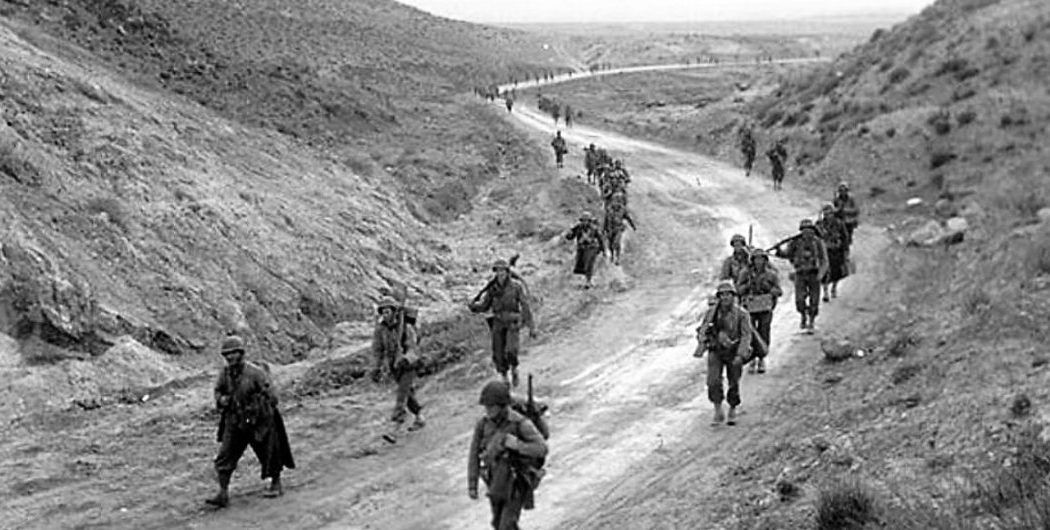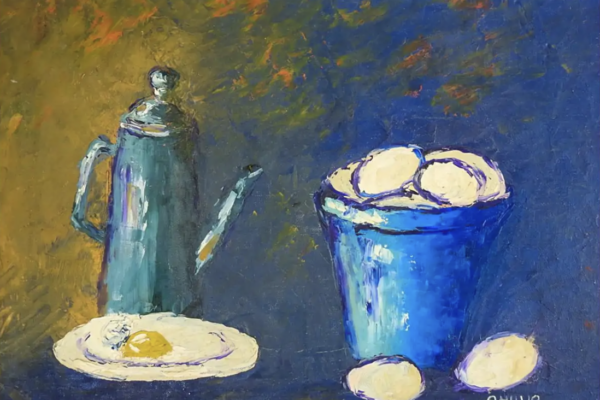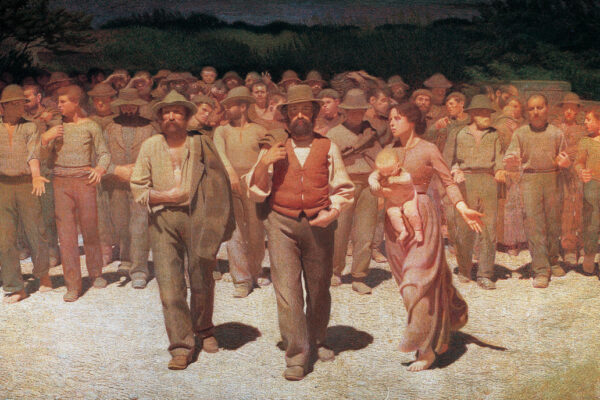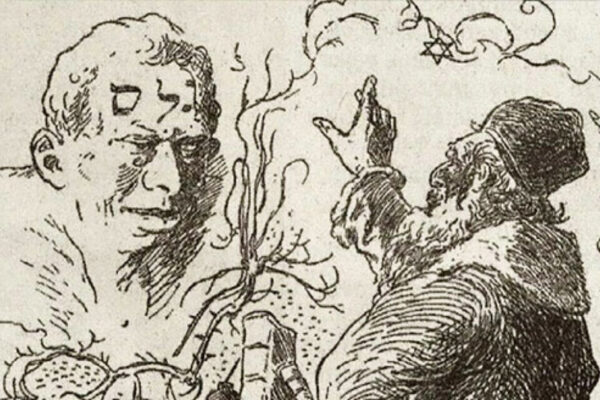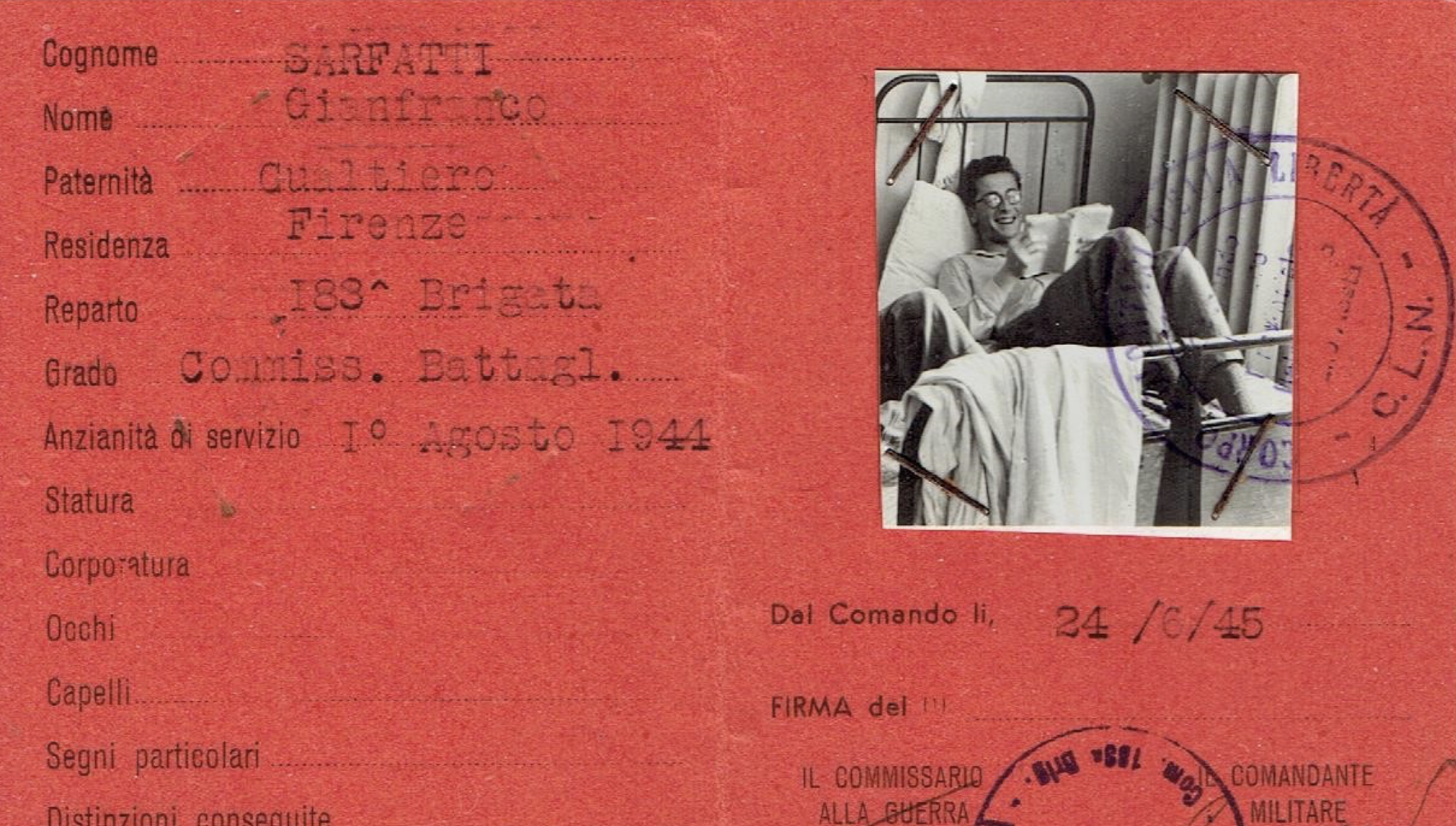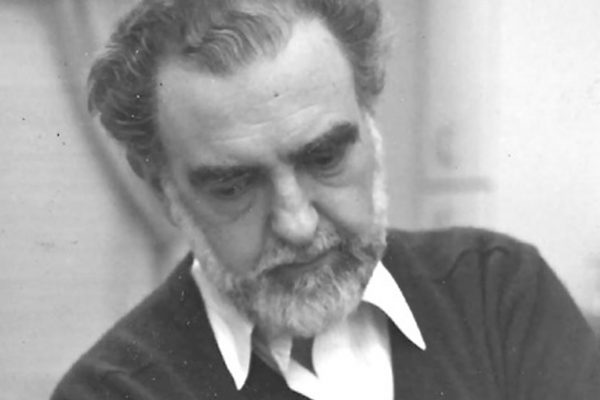Tuscan Memories of the Nazi Deportation: Devoto’s Oral Archive (1987-1989)
Andrea Devoto (1927-1994) was an Italian psychologist, a professor of Social Psychology and the director of the Ospedale Psichiatrico in Maggiano (Lucca) and the Ospedale Psichiatrico San Salvi in Florence.
At the end of World War II Devoto, then in his late teens and working as a volunteer, took part in the reconstruction of cities across Central and Eastern Europe, during which time he became deeply interested in the history of the concentration camps, particularly from a psychological perspective.
He would subsequently publish the important Bibliography of Nazi Oppression, (1964), write many essays on the camps, and – together with Massimo Martini – La Violenza nei Lager, (1981) and, four years later, Human Behavior in Extreme Conditions: the Social Psychologist and the Nazi Lager.
In 1986, Devoto decided to do a series of interviews with Tuscan survivors of the deportation to the Nazi KL (Konzentrationslager – concentration camps) which he modeled on interviews conducted in Piedmont earlier by a team led by Primo Levi.
Like Levi, Devoto organized several study sessions with his team, who would read the copious literature on what was then called the Holocaust. At the end of 1987 he had his first meetings with the survivors, and the interviews were completed by mid-1989.
What he found was the profound psychological and physical consequences of their detention – decades after the liberation – not only continued to exert considerable psychological damage and a wide range of health problems, but that in many instances had resulted in premature deaths. Devoto writes that at the end of the 1980s, of the approximately 559 survivors from Tuscany who came home in 1945, only 105 were still alive, and of those only 70 were available for an interview. The rest were either incapable of participating due to mental illness, or were otherwise unwilling to recall the memories of their death camp experiences. In the end, the actual number of people interviewed was 69: 60 “political” prisoners and 9 Jews.
In Tuscany, the total number of deportees was 1821: 857 Jews and 964 political deportees. The percentage survival rate was, according to ANED (the National Association of ex-Deportees), 30% for the so-called political prisoners and 9% for the Jews. In fact, recent research shows that the percentage of “political” deportees who managed to survive was even higher, up to 50%. Since only 9% of the Jews managed to come back, the number of Jews and non-Jews interviewed by Devoto coincides, percentage-wise, with the number of those who survived -: 482 “politicals” and 77 Jews, respectively 85% and 15% of the total.
When the research was completed, all tapes and transcripts were given to ANED. The resulting 2400 pages of interview transcripts were both informative and moving, but resulted in only one book, La speranza tradita (Hope Betrayed – a very odd title), published in 1992. The author of the text made a decision not to appear in the interviews, choosing instead to break it down into a series of themes (‘Before the Arrest’ ‘Arrival in the Camps’, ‘Starvation’, ‘Liberation’, ‘Back in Italy’, etc.), using selected relevant interview fragments to fill them out.
Evidently, only a small part of the information contained in the interviews was used and, more importantly, the chance to identify individual witnesses and stories was lost.
Subsequently, the interviews ceased being used, mainly due to the death of Devoto in 1994. ANED did, however, manage to bring out several reissues of La speranza tradita, over the next few years.
Ten years later when the Shoah Foundation conducted its interviews in Tuscany, only one of the 65 survivors interviewed by Devoto was interviewed again. His name was Isacco Bayona, a Jew from Livorno. This happened because the Foundation project was not interested in non-Jewish deportees, because some of the Jews interviewed by Devoto were now deceased, and because the persons interviewed by the Shoah Foundation had to volunteer, while Devoto had obtained the names of the survivors from ANED who had put some pressure on them to grant the interviews. The survivors had joined ANED mostly for practical reasons (i.e. to obtain the status and benefits of a “deportee”). But they were reluctant to share their experiences, and probably would have chosen not to be interviewed had it not been for the pressure to comply with ANED. One of them, in fact, still refused to be interviewed.
This is a very important point, for it explains in part why the witnesses interviewed by Devoto were so different from those interviewed by the Shoah Foundation. The latter, all volunteers, delivered interviews that were intended to convey a message of hope to new generations, in spite of the horrors suffered. Conversely, those survivors interviewed by Devoto could, for the most part, find nothing positive in the terrible experience they suffered. Most of the survivors interviewed by Devoto, discouraged by the experience of the decades-long disinterest of friends and family in their stories, had been reluctant to participate. And in the late 1980s the survivors clearly still did not sense the significance of their testimony nor were they aware of the potential interest in it. While many survivors died soon after giving the interviews, those who lived on into the 1990s became very active in their efforts to relate their experience. Times had changed and now they could feel the importance of their stories.
And yet Devoto’s interviewees are more representative of that experience precisely because they were not volunteer witnesses, and especially because they had all been in concentration camps, while only a small number of those interviewed by the Shoah Foundation had been.
These survivors often express a willingness to speak (more often, as we shall see, than in the interviews done later on) of the many physical – and particularly the psychological – problems that continued to plague them in the post-liberation years, and which rendered their release incomplete, in a sense. Thus Devoto’s field work was able to include the wider arc of their detention as well as of their subsequent lives.
A distinction is usually made between those who were deported for what they had done (the political activists, the criminals, the so called “asocials”) and those who were deported for belonging of a persecuted group: Jews, Gypsies, homosexuals, Jehovah’s Witnesses. Any examination of the texts that analyze the deportation from a quantitative point of view reveals that the most non-Jews deported from Tuscany were called Schutzhaftlinge (persons deported for security reasons) and Politisch (deported for political reasons). However, in the vast majority of cases they were in no way political militants but were either deserters or, (in most instances), young workers, very few of whom were involved in political anti-fascist organizations but who more often belonged to a unique proletarian background which was never fully fascist, a sub-culture which managed to keep a certain distance from the more militant fascism without being explicitly anti-fascist.
Several, for instance, were arrested by the soldiers of the Fascist Social Republic in Prato, Florence or nearby Empoli during a political strike in March of 1944, a day when they’d gone to work and were told that the factory was closed, with the result that they were walking through the streets and simply found themselves in the wrong place at the wrong time. Most of them were sent to Mauthausen (34), Ebensee (19) and Dachau (14).
Since they were born under the Fascist regime they had only a vague idea of what a strike was, and yet they were deported as political militants. One was arrested because he went to visit his mother who’d been arrested as well (on that occasion the women were not deported). Another was arrested, along with his brother, by the fascist Republicans while he was playing billiards. A sixteen year-old boy who went to plead the cause of a friend who’d arrested by the Germans managed to get all the way to the German command without being stopped by the Fascist Republican authorities – whose task was protecting the Germans. The German High Command complained to the Fascists who then arrested the boy as punishment for that reprimand. I’ll say that again, he was 16 years old and was sent to Ebensee.
Three others were arrested as soldiers after the Italian surrender on 8 September, 1943 and were sent to Germany as IMI’s Internati Militari Italiani, (Italian military internees), where conditions were quite a bit better than those faced by the prisoners in the KLs, not least because, although they didn’t get much to eat, they didn’t die of starvation; and were not supervised by the SS but by the Wehrmacht. But that position would change and they later became KL prisoners. One of them was caught stealing food after having escaped from the IMI prison, was tried and sent to a concentration camp; another who worked in a factory accidentally broke a hydraulic press, was tried for sabotage and sent to the camps; still another committed no “crime” at all but was simply caught up in the technological drift that brought him to the KL – he had worked in a missile factory whose IMI status was changed because the Dora project needed workers with experience in missile manufacture.
The majority of these people had no notion whatever of politics and anti-fascism.
As Augusto Lupo attested: I know nothing about politics. I’m a political deportee but I truly knew nothing about politics. They made me a political deportee because I refused to collaborate with the Germans, and yet, even today, honestly, I know nothing about politics…” (Augusto Lupo)
Their misfortune was that they were working-class people, and the Germans were desperately in need for industrial labor at a time when very few Italian workers were volunteering to work in Germany.
So, in most cases, these men were arrested not for what they had done, but for what they were: young workers available for slave labor in Germany.
It should be noted too that the Fascists had long maintained a degree of suspicion towards factory workers, whom they regarded as potentially subversive and difficult to control; so they were often treated with additional condescension and paternalism. Conversely, blue collar workers maintained a certain class antagonism toward Fascism, perceiving beyond the official propaganda how the Regime found ways to perpetuate class privileges.
Not being really political, the factory workers could not have imagined what lay in store: the treatment they experienced in the camps was entirely unexpected and therefore additionally shocking and psychologically destructive. Enzo Gandi, a partisan, says that he “knew perfectly well” what awaited him in the KL. The contact between Italian and German anti-fascists improved the conditions of the real political prisoners and on one occasion, in Mauthausen, Gandi was helped by the clandestine Communist network when Paietta – an Italian Communist leader in the camp – managed to get him moved to a less strenuous work area.
But the majority of the so called “politicals” were not in any position to enjoy such protection, precisely because they were not political at all and were, therefore, not recognizable as comrades by any clandestine network. In addition, since they were not very well educated and didn’t know any foreign languages, in particular German, they couldn’t figure out ways to get less arduous work and were often sent to the most deadly work sites, such as quarries, or places where they had to dig tunnels in rock. On top of that, and again due to their ignorance of German, they couldn’t understand orders properly and were beaten more severely than other groups of deportees – beatings that were sometimes fatal and frequently caused permanent damage: anything from chipped teeth and bruised kidneys to broken bones, and heads struck hard enough to create permanent brain damage.
They soon realized that they’d been put away in places where they were “expelled from life” (Bruno Paoli) and they very soon reached a stage where death seemed desirable, since “death was health” (Domenico Chirico) ; when the camp was bombed “it was a joy, if I die it’s all over” (Martino Gacci).
The interviews are full of information about the systematic violence perpetrated by the Germans and kapos (camp supervisors) on their prisoners, but since this issue has been treated in depth elsewhere, it’s not necessary to cover it in detail here. I would prefer instead to focus my attention on the psychological consequences of detention, both during and after imprisonment, since the interviews are particularly interesting from this point of view.
Devoto’s interviews include the most odious and ambiguous aspects of concentration camp life, which are less frequently touched on in subsequent accounts. Survivors tell very explicitly how the camps’ chain of command destroyed any altruistic impulse among prisoners, how all the normal moral hierarchies were totally overturned and how each prisoner found himself totally alone in the face of death.
There are many statements that show how, in order to survive, prisoners had to learn to deaden of their emotions, how they had to become indifferent when fellow prisoners were beaten or hanged “ we would say: so much the worse for those with no luck.” (Andrea Barsanti).
(The horror) “…no longer had such a terrible effect on us, because every other day in the infirmary we had to remove the dead. We were taking the dead (…) and we were throwing them out the window”. (Vinicio Goretti)
The deportees had to collectively attend in silence the ritual hangings of those who had tried to escape from the camp. “In the long run (that display) became such a habit that we no longer felt anything about it. I remember being reborn when I cried so much after seeing my mother again… (pause) I remember when I started to cry again.”(Cesare Pilesi).
Even those who were sentenced to be executed appeared to take their future death in a very cool way: “Sunday morning they will hang me. Come and take my soup, what can I do with it?” (Martino Gacci).
Those who pined after their loved ones were less likely to survive. Lupo says that he had no memory of home, “I was just thinking about eating, that’s all. I was always hungry, always looking for food”. (Augusto Lupo)
“Another very interesting thing: the separation from your loved ones. You must not believe that everyone in the camp thought about home sweet home: we no longer thought of anything, we’d become like animals: no more memory of our father or mother or girlfriend or love: nothing” (Aldo Moscati).
“Besides, those who remembered and cried: they died. Actually, our humanity had been destroyed, so that …there was only one law in the concentration camp: grab what you can. Theft was not considered theft any more; it was considered almost an act of bravery: to steal bread to from someone who kept it hidden (because we weren’t supposed to keep anything, right?) was considered almost a brilliant act.” (Aldo Moscati).
“There was a girl, poor thing she was more dead than alive. She had two or three pieces of bread; the poor thing was sick, she seemed unable to eat. In short, I found these pieces of bread and I ate them. Then she was looking for her bread: ‘Mary, did you see it?’ ‘No, I didn’t.’ Instead I had already eaten it”. (Mary Graziani Grifoni).
This total selfishness is another theme of the survivors’ stories. “Unfortunately, everyone was thinking of himself; everyone was fighting for survival.” (Maria Furst Castro).
“There was no possibility of helping each other. If I found a leaf on the ground I would eat it alone, and certainly wouldn’t give any to anyone else”, Luciano Paoli said. But he added that this was exactly what the Germans wanted, to deprive the prisoners of all humanity in order “to make us become “Muselman”, in order to ensure that we would comprehend nothing”.
There are even testimonies, very rare, of those who reached that stage that led to a very rapid death: “I had lost all sense of time, I didn’t know whether I was alive or dead. Fortunately that (only) happened to me at the very end (of my detention, before the liberation). I was an automaton, a robot. I didn’t understand anything. I’d like to show people what it means when life has no meaning at all. You no longer have anything … life was like that there (he points at an object): a non-life. Or at least so it seemed to me” (Augusto Lupo)
Listening to these interviews, one has the impression that the true value of the testimony given by these witnesses was, by the end of the 1980s, not yet wholly and publicly recognized, or at least that the paradigm within which these witnesses provided undoubtedly compelling accounts had not been fully developed.
It seems clear that the personal accounts of what went on in the concentration camps was also not yet public but still restricted mainly to those who had had the same experiences.
“(After we got home) we retreated into our shells like snails, and we spoke only with our fellow prisoners. I see the flaws of my companions, they definitely see my flaws. But among ourselves we look each other in the eyes, we endure and we know. We avoided contact with others until the National Association of former deportees, ANED, was founded” (Luciano Paoli).
ANED wasn’t founded till 1968.
Paoli is no exception: the majority of the survivors, in their sixties when interviewed, seem to have been very reluctant to tell their story to “others”; this included even close relatives and friends, both immediately after their return home and afterwards.
“Why should I tell my story to people? Just to amuse them?” (Andrea Barsanti). “The less I talk about it, the better I feel” (Franco Bani).
“I do not like to tell what happened to me, because it opens up a very deep wound (…) the past: I put a lid on it, don’t want to think about (…) I don’t like talking about these things here, not to grieve the souls of others (…)” (Isacco Bayona, who lost his entire family at Auschwitz.)
It seems plausible that these witnesses preferred not to tell their stories because “others” often expressed disbelief in them:
“After returning home we were telling of our experiences. In the concentration camp our older fellow inmates told us to keep our brains in good shape. Those who had remained alive had to tell, they must transmit our experiences to everybody. But at home they thought we were crazy. I think my mother thought: ‘He came back a bit cracked, this guy.’…” (Luciano Paoli)
“…I’ve spoken many times with friends, but they thought I was exaggerating, they said that I was crazy, so I didn’t talk anymore” (Rolando Mugnai)
“These things are incredible, you can’t believe them. A normal person says ‘But that’s crazy, it’s impossible for him to have lived like that.’ (…) my friends don’t even know I was in a concentration camp (Auschwitz), don’t even know I have a tattoo on my arm, when they find out they remain open-mouthed”” (Isacco Bayona)
Witnesses sometimes confessed that they themselves thought that what had happened seemed unbelievable:
“Whenever I go to bed I think, ‘How did I come back?’ Many times I wonder how I managed to get back. Many times I must tell (to others) things (to others) that I myself believe impossible. I’ve seen things that are incredible. I don’t believe them myself, so how can I persuade others that they were true?” (Aldo Rovai)
“We, the survivors of concentration camp Dora, gather together every year and we say, ‘it’s impossible that we lived like that. How could we have lived like that and come out alive?’.” (Niccolò Carpené)
“When I returned to Mauthausen (…) a few years ago, we visited the cemetery. There were records of all the names of the dead (…). Leafing through this log, I went to look for the name of a person who was with me there in Mauthausen, he was from Milan. And when I saw his name on the register, I said, ‘so I really knew him!’ It seemed to me that it was just a fantasy…” (Carlo Scatena).
In short, it seems that listeners had difficulty believing the stories and were only persuaded to in consideration of generally known facts, as for example the very high number of those who never returned.
“When we got back and were telling about these things, people thought we were fanatics. They said: ‘These are fables.’(…) But later they said, ‘Some of it must be true, the Germans captured four hundred and eighty people and only nineteen came back. Where are the others?’ This was an important point” (Roberto Castellani).
In other words, it seems that some believed the story despite the “unbelievable” details. Perhaps even the early visits to the concentration camps were born from the need to prove to others, and first of all to themselves, that the experience had, in fact, been real. Those visits, more private than visits to the camps are these days, were called “pilgrimages” and the attitude of the survivors towards them was complex. Some simply refused to go.
“They told me many times ‘Let’s go there.’ I’m sorry, how can I put it? If I see that again I’ll get sick to my stomach and begin to cry. I can’t; it’s better if I don’t go back there to see it again” (Giovanni Bicciato).
“I don’t feel like seeing the places where (I was a prisoner)again. I didn’t like it because I didn’t feel like going, because I’d seen too many things.” (MarioAbenaim)
Many went on a pilgrimage once but refused to repeat the experience. Some were offended by the mocking attitude of the Germans living near the camps, or they had simply suffered too much to repeat the experience:
“If I think of going back there, I don’t like it.”
“I’ve been there once: but no, I will not go back there again.”
Some thought they must go out of respect for their fallen comrades, and some express a highly ambivalent attitude towards the pilgrimage:
“I feel as if I was at home, the camp (Ebensee) does that to me. I don’t know why (…) I feel as if I had always lived there (…) I don’t know: it gives me this feeling, yes. If I could go there every month, I would go. I don’t know why there is this feeling, I don’t know how to explain (…) when we are in the concentration camp, I live it like when I was over there, then. When I am in the village: then I am a bit more….practically…I am a bit more peaceful.”(Dorval Vannini).
Here we come to a very important point, the extreme difficulty of overcoming the concentration camp experience, which, in the example just given, remains suspended in a sort of limbo, fluctuating between a positive and a negative, an experience which in many other cases appears as a past that fails to subside, that haunts its victims permanently with various psychiatric symptoms, from insomnia or disrupted sleep to negative irreversible personality transformations.
“Sometimes it happens at night, I wake up badly. Because maybe you relive a moment in which you were afraid, and this is a nightmare. I try to overcome it, but it is difficult” (Aldo Becucci) .
“I had extreme exhaustion, I had nightmares, at night I was screaming, I was stricken by a kind of epilepsy” (Frida Misul).
“My reintegration into normal life in society, it has been difficult. First of all I thought that if I told of certain things I would be considered a fool. Then, even if someone encouraged me to talk, after two or three minutes I would feel a lump in my throat, anger about what I went through would come over me (…) I would begin to cry” (Nedo Nencioni) .
“At night my wife wakes me up: ‘What are you doing?’ ‘I dreamed that the
Germans were running after me.’ How many times, Madam, how many times I dream of the Germans. It is incalculable. Luckily my wife is a light sleeper and wakes me up. I always dream that the Germans are shooting me, or that they’re giving me the coup de grace. Always, always. Or I dream that the Germans are chasing me…”(Franco Bani) .
“Since I returned to my family I’ve had a tough time, because I’ve suffered from insomnia for over ten years. (…) This experience left a deep impression on me: I became mistrustful, suspicious, touchy. Before that I had a completely different character. In short, I went through a great transformation and heightened nervousness. I became nervous with my family. Luckily my wife puts up with me. In short : my behavior is not normal” (Luciano Paoli) .
“Some nights I would toss and turn in bed, and my wife would say, ‘what’s the matter’? I’d say, ‘Nothing’. My poor mother would ask me, ‘What’s happening to you?’ ‘Nothing.’ My wife has learned something after (being at) the gathering of the Dora camp survivors. Before she had not heard anything about it. I never talked, never, never. A sister of mine told me, ‘You ignored your mother. She wanted to know and you never said anything’.” (Niccolò Carpené)
“I came home sick. After two days I had a fever. For a year and a half I had nephritis, pneumonia, pain, blood bubbling…” (Amos Porciani)
“Only a few of us returned to Montelupo, just five of us; now I’m the only one still alive. One poor fellow went insane, interned ever since then in an asylum in Florence…” (Aldo Rovai)
Augusto Lupo says that his sensitivity is now altered. He reacts abnormally to slight noises, such as a spoon falling on the floor or a door closing. He has uncontrollable emotional reactions to television programs, “I cry over nothing.”, “I’m not very sociable, I get emotional about everything.” “The concentration camp made me this way”, he says; (after returning) “I became like this. Before I wasn’t like this.” Prior to this he had an emotionally normal manner. “This is a result of imprisonment. I left as a young man and when I came back I was an old man…” (Augusto Lupo).
“For three years (after returning from the concentration camp) I always stayed at home. I didn’t see anyone. I was angry because I thought that I’d paid the debts of who knows what (…). When you return from a concentration camp, at first you seem to spring back. But then there comes a moment when you collapse again. There are memories that crop up from the sight of a photograph. Your eyes transmit them to your brain. Then, maybe while you’re asleep, that old fear hits you. It happens by degrees … And then you come back as lean and lanky as you were then, nervous, you live in a world of your own, you don’t even see the others around you …” (Fiorello Consorti)
“It is a burden that you carry with you for life, I think, now: you carry it with you for life.”(Luciano Paoli).
These psychological consequences of detention were studied in depth immediately after the war, yet as a topic have become increasing less discussed in interviews conducted since the early nineties, perhaps because the prevailing current interview model favors a happier ending.
In fact, though, this alleged happy ending is usually viewed as such only from the perspective of the family, and scarcely corresponds to the fate of the individual who while they managed to survive the concentration camps are frequently destined to bear forever the physical and psychological consequences of that experience.
But the accounts given in the 1980s were not yet embedded in that “genealogical” optimism which was to become more characteristic of the next decade.
Thus we see how difficult it was to bear the trauma of the camps, which many years later still continued to ruin the lives of those who managed to escape physical annihilation.
Finally, it is interesting to analyze the distinction between the memories of the Jewish survivors and those of the non-Jews, both strongly colored by the radically different situations they found on their return to Italy.
As regards the Jewish prisoners, it should be noted that there was an initial and fundamental personal difference affecting their accounts. Most of them lost their relatives immediately after arriving at Auschwitz or in the following months. Others, on their return home, found that part of their family (and sometimes their entire family) had been exterminated. Consequently their memories of the Shoah are even more bleak and hopeless.
Only one witness, Frida Misul, found on her return that her whole family had managed to survive. It is interesting to note that she was the first, among the Jews interviewed by Devoto, to write her memoirs and willingly travel to schools and talk about her experience. She says that she managed to overcome her psychological problems (if not her physical ones) and that she likes to go to Auschwitz. Furthermore, she is the only interviewee who says that she emerged from that experience a better person: “I became better, yes, better, and I always try to act positively (…) because now I am safe”. No other witness, Jew or non-Jew, claims that he or she was improved by the experience of the concentration camps. Indeed, another survivor, who was also Jewish and residing in the same city as Misul, says that he tries “to avoid” her (“I respect her as a woman”) “because she always wants to talk about the deportation, because she has no more pain (…) she did not suffer the loss I suffered”. He, conversely, lost his entire family and only wanted to forget, not to remember.
For most, the sufferings they endured in the camps came on the heels of those caused by the Racial Laws (1938), and were followed by the shock of learning about the fate of their families once they were back home, – a span of almost ten years during which their lives and their world had been profoundly and indelibly transformed.
Italian Jews, previously well integrated into Italian society, were completely unprepared for the Racial Laws. Many of their non-Jewish neighbors and friends promptly followed the chilling rules and warnings embedded in the racial laws, and showed little solidarity toward their former friends. Italian Jews were to be further shocked by the German occupation of Italy, when the policies of deportation and extermination were implemented. In fact, from 1943 to 1945, the Italian fascist Republicans zealously aided the Germans to capture Jews, while ordinary Italians wavered between solidarity (at times heroic) and betrayal.
If Italian Jews had formerly identified themselves completely with the Italian homeland, after the war their identity became more complex. Their ties with the Jewish community and Judaism become stronger. Many who before had not been religiously observant became more devout after the persecution, and many identified strongly with the new state of Israel and supported it (a well-known and widely studied phenomenon).
Conversely, little is known or has been studied on the subject of the so called “anti-fascists”, (the majority of whom – it bears repeating – had been arrested by chance and were not at that time consciously anti-fascist), and the accounts of their experience and its lasting impact once they returned home.
When we compare them to the Jews, it becomes evident that the situation they found on their return from the camps was very different; in fact, much better. They seldom discovered that a family member had died, and their families and friends had, in general, been unharmed. But for them this was often the very thing that became problematic and difficult to overcome. Friends and family members were, like everyone else, committed to rebuilding their lives in a post-war Italy, but the survivors felt out of tune with them.
They could not, like their fellow Jewish sufferers, see their sufferings as part of an over-arching, epochal tragedy. Once back home, these “political” deportees discovered that their world had been transformed only superficially by the war, and this is why they often lamented that friends and family simply could not believe their stories.
I think that while this disbelief was indeed frequently real, their rebuking of family and friends (“they did not want to listen, they did not believe”) was more often, perhaps, an expression of their sense of estrangement and isolation after the war.
They had suffered an extraordinary level of violence, humiliation and terror, an experience they could not erase and which continued to haunt them. But at the same time, while these survivors could not elude their suffering, all the others at home had experienced some degree of wartime violence and suffering which was incommensurable with what they had gone through.
Furthermore, following the end of the war relatives and friends frequently became pleasantly immersed in the optimistic and euphoric atmosphere of post-war Italy during the years of so-called “national reconstruction” The survivors, on the other hand, were different and felt themselves so. For many years they could not find the help of any association or institution, (and, remember, their association, ANED, wasn’t founded till 1968.) What’s more, for many years the attention of the public was focused exclusively on the partisans and the Resistance, and ignored these deportees completely. “It was the time of the partisans, and all those who were not partisans were fascists”, as Giovanni Muraca points out.
Thus for a long time they “retreated into (their) shells like snails, and spoke only with (their) fellow prisoners,” to again quote Luciano Paoli.
Perhaps it’s because of their extenuated difficulty in obtaining public acknowledgment that these “anti-fascists” who survived the death camps talk so often about their psychological problems, almost as if their suffering and its singularity can only be recognized in the form of mental illness and their trauma only characterized in psychiatric terms.


